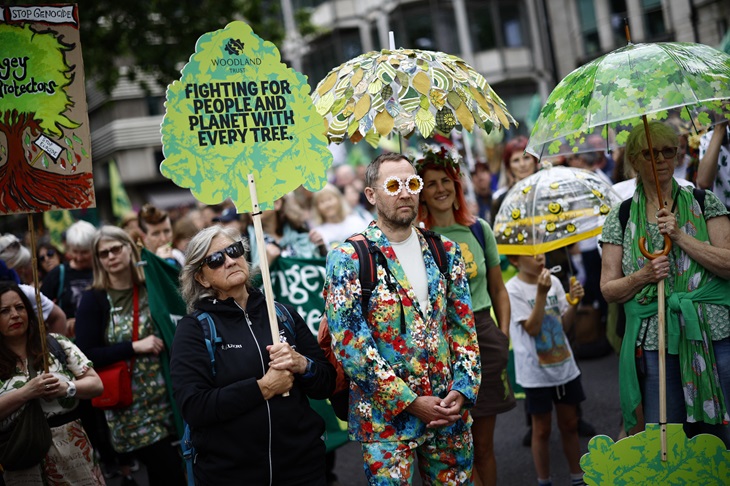
Demonstrators with nature-themed outfits and umbrellas take part in the "Restore Nature Now" protest supported by Extinction Rebellion (XR), National Trust and WWF in London on June 22, 2024. (Photo by BENJAMIN CREMEL / AFP) (Photo by BENJAMIN CREMEL/AFP via Getty Images)
Recent discussions have illuminated the growing disconnect between wealthy voters and the pressing needs of economically disadvantaged communities in Australia. As the political landscape shifts, many affluent individuals appear increasingly engaged in environmental causes, often prioritizing their own status over substantive social change. This trend raises critical questions about the implications of wealth on voting behaviors and policy choices.
Daniel Lewkovitz, a candidate who ran against Teal MP Allegra Spender, highlighted a significant observation regarding the motivations of affluent Australians. He noted, “These are people who are fabulously wealthy … they feel terrible about it.” This sentiment reflects a broader dilemma where the wealthy, rather than engaging in traditional philanthropy, pursue ambitious goals of global reform. Lewkovitz argues that this pursuit often leads to policies that inadvertently burden those struggling to meet basic needs.
The term “Eco-chic” has emerged to describe the phenomenon where affluent individuals adopt environmental causes as status symbols. This trend has roots in the past, when wealthy individuals engaged in charitable efforts like soup kitchens or community support. However, the current focus has shifted towards more abstract ideals, such as climate action, without a corresponding commitment to address immediate socioeconomic challenges.
The Net Zero initiative exemplifies this shift. While the concept aims to reduce carbon emissions, it has become a convenient label for those seeking to alleviate guilt associated with wealth. Critics argue that the focus on achieving Net Zero can overshadow urgent issues like housing affordability and food security. The disconnect is stark: many wealthy voters advocate for climate policies while ignoring the tangible hardships faced by the working class.
Since the turn of the millennium, global events have reshaped the nature of activism among affluent Australians. The rise of domestic protest culture has allowed those with privilege to champion causes that align with their values. Yet, this often occurs in a sanitized manner, detaching the privileged from the harsh realities of those they seek to help.
The political implications of this phenomenon are profound. According to Sussan Ley, Australia’s opposition leader, understanding the priorities of elite voters is essential for effective policy-making. Many of these voters desire a world where their needs are met without confronting the uncomfortable truths about inequality and systemic issues.
Moreover, Lewkovitz’s critique emphasizes that the affluent have a choice in how they engage with politics. He contends that wealthy individuals do not need to support parties whose policies exacerbate economic disparities. Instead, he advocates for a more grounded approach where investment is directed towards local businesses, ultimately benefiting the community.
As the 2022 elections illustrated, the focus on “Luxury Beliefs” among affluent voters is increasingly scrutinized. The consequences of their choices affect not only their lives but also the lives of those struggling to make ends meet. Lewkovitz pointed out that policies favoring the wealthy can lead to significant price increases for essential goods and services, further entrenching socioeconomic divides.
In conclusion, the relationship between wealthy voters and environmental activism in Australia is intricate and fraught with contradictions. The emphasis on status-driven causes can detract from addressing the urgent needs of economically disadvantaged communities. As the political landscape continues to evolve, it is crucial to bridge the gap between privilege and responsibility, encouraging a more equitable approach to policymaking that prioritizes the welfare of all citizens.






